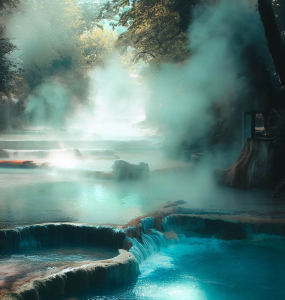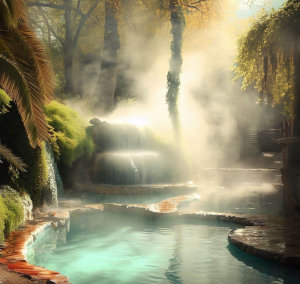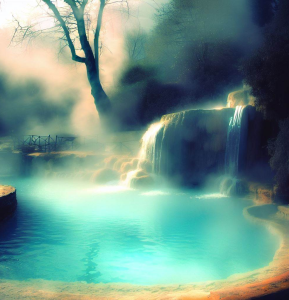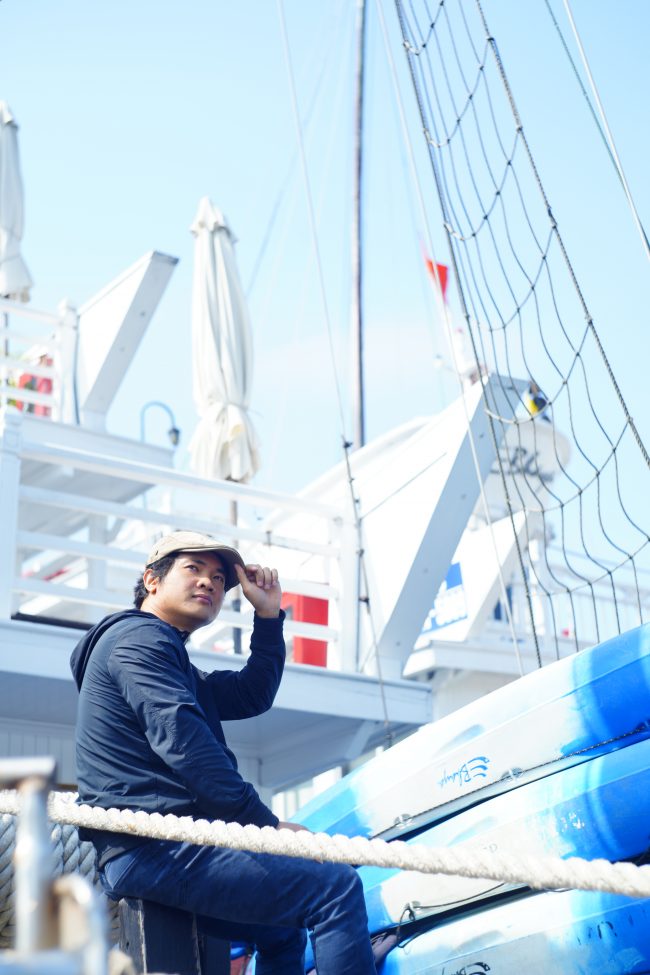Greece is a country blessed with natural beauty, rich culture, and ancient history. But did you know that it also has some of the best hot springs in the world? Thanks to its unique geology, Greece has more than 700 natural hot springs scattered throughout the mainland and the islands, and many of them have been recognized for their healing properties since ancient times. Whether you are looking for relaxation, rejuvenation, or therapy, you will find a hot spring that suits your needs in Greece. In this guide, we will introduce you to the 10 best hot springs in Greece, and tell you everything you need to know about them.
1. Pozar Thermal Baths
Located at the foot of Kaimaktsalan mountain in Pella, northern Greece, the Pozar thermal baths are among the most popular and scenic hot springs in Greece. The name Pozar means “burning” in Greek, and refers to the hot water that gushes out of the rocks at a temperature of 37°C (98.6°F). The water is rich in minerals such as sodium, potassium, calcium, magnesium, sulfur, and iron, and is said to have beneficial effects on skin diseases, rheumatism, arthritis, and gynecological disorders1. The Pozar thermal baths complex consists of several indoor and outdoor pools, jacuzzis, waterfalls, and caves that you can enjoy all year round. You can also take a walk along the river or visit the nearby watermill and museum. For accommodation, you can choose from a variety of hotels, guesthouses, and camping sites in the area.
2. Kamena Vourla
Kamena Vourla is a seaside town in central Greece, about 150 kilometers (93 miles) north of Athens. It is famous for its thermal springs that were discovered in the 1920s and have been attracting visitors ever since. The thermal water of Kamena Vourla has a temperature ranging from 30°C to 40°C (86°F to 104°F), and contains radioactive elements that are believed to have healing properties for various ailments such as arthritis, neuralgia, hypertension, kidney stones, and skin problems2. The town has several spa facilities that offer hydrotherapy, thalassotherapy (sea water therapy), mud therapy, massage, and other treatments. You can also enjoy the beautiful beaches, the pine forests, and the nearby cultural and natural attractions such as Delphi, Thermopylae, and Mount Parnassos.
3. Lake Vouliagmeni
Lake Vouliagmeni is a brackish lake located on the Athenian Riviera, about 20 kilometers (12 miles) south of Athens. It is formed by an underground spring that feeds seawater into a collapsed limestone cave. The lake has a constant temperature of 24°C (75°F), which makes it ideal for swimming all year round. The water of Lake Vouliagmeni is rich in minerals such as potassium, sodium, calcium, magnesium, chloride, iodine, and sulfur3, and has therapeutic effects on skin conditions, arthritis, muscle pain, and stress. The lake also has a unique ecosystem that hosts various species of fish, crabs, snails, and even small underwater caves. You can relax on the sunbeds or hammocks around the lake, enjoy a drink or a snack at the cafe-bar, or indulge in a spa treatment or a massage at the wellness center.
4. Edipsos
Edipsos is a spa town on the island of Evia, about two and a half hours from Athens by car or ferry. It is one of the oldest and most famous spa destinations in Greece, dating back to ancient times when it was visited by prominent figures such as Aristotle, Plutarch, and Roman emperors4. Edipsos has more than 80 thermal springs that vary in temperature from 28°C to 86°C (82°F to 187°F), and contain high concentrations of magnesium, calcium, and iron5. These minerals are said to have beneficial effects on skin diseases, rheumatism, arthritis, gout, and neuralgia5. Edipsos offers a wide range of spa facilities that cater to different preferences and budgets. You can choose from luxurious hotels, traditional guesthouses, or modern apartments that provide access to indoor or outdoor pools, jacuzzis, waterfalls, and fountains. You can also find semi-thermal seawater at some beaches where the hot spring water mixes with the sea4.
5. Methana
Methana is a volcanic peninsula in the Saronic Gulf, about two hours from Athens by car or boat. It is known for its 32 thermal springs that are scattered along its coastline and inland. The thermal water of Methana has a temperature ranging from 25°C to 40°C (77°F to 104°F), and contains sulfur, chlorine, sodium, and potassium. It is reputed to have healing effects on skin disorders, respiratory problems, arthritis, and rheumatism. Methana has several spa centers that offer hydrotherapy, mud therapy, inhalation therapy, and massage. You can also enjoy the stunning views of the sea and the mountains, the picturesque villages, and the ancient sites such as the Temple of Apollo and the Acropolis of Methana.
6. Lagadas
Lagadas is a town in the Thessaloniki region of northern Greece, about 20 kilometers (12 miles) from the city center. It is famous for its thermal springs that were discovered in the 19th century and have been developed into a modern spa resort. The thermal water of Lagadas has a temperature of 39°C (102°F), and contains sodium, chlorine, iodine, bromine, and sulfur. It is said to have beneficial effects on skin diseases, rheumatism, arthritis, neurological disorders, and gynecological problems. The Lagadas spa complex consists of several indoor and outdoor pools, jacuzzis, saunas, steam rooms, and massage rooms. You can also find a fitness center, a restaurant, a cafe, and a playground for children.
7. Krinides
Krinides is a village in the Kavala region of northern Greece, about 150 kilometers (93 miles) from Thessaloniki. It is famous for its mud baths that are located near the ancient site of Philippi, where the Apostle Paul preached Christianity in the first century AD. The mud baths of Krinides are formed by a natural spring that flows into a clay pit. The mud has a temperature of 45°C (113°F), and contains minerals such as magnesium, calcium, iron, and sulfur. It is said to have healing effects on skin diseases, rheumatism, arthritis, sciatica, and osteoporosis. The mud baths of Krinides are open from May to October, and you can apply the mud on your body or immerse yourself in it for 15 to 20 minutes. You can then rinse off with fresh water or take a shower at the nearby facilities.
8. Agia Paraskevi
Agia Paraskevi is a seaside village in Halkidiki, northern Greece, about 120 kilometers (75 miles) from Thessaloniki. It is famous for its thermal spa that was built in 1979 and has been renovated several times since then. The thermal water of Agia Paraskevi has a temperature of 39°C (102°F), and contains sodium, chlorine, iodine, bromine, sulfur, and radon. It is said to have healing effects on skin diseases, rheumatism, arthritis, neuralgia, and circulatory problems. The Agia Paraskevi spa complex consists of several indoor and outdoor pools, jacuzzis, saunas, steam rooms, and massage rooms. You can also find a fitness center, a beauty salon, a restaurant, a cafe, and a souvenir shop.
9. Loutraki
Loutraki is a coastal town in the Corinth region of southern Greece, about 80 kilometers (50 miles) west of Athens. It is one of the oldest and most renowned spa destinations in Greece, dating back to ancient times when it was known as Thermae or Hot Springs. The thermal water of Loutraki has a temperature of 31°C (88°F), and contains sodium, chlorine, potassium, calcium, magnesium, bromine, iodine, and sulfur. It is said to have healing effects on skin diseases, rheumatism, arthritis, kidney stones, hypertension, and stress. The Loutraki spa complex consists of several indoor and outdoor pools, jacuzzis, water jets, and massage rooms. You can also find a thalassotherapy center that uses seawater for various treatments. You can also enjoy the beautiful beaches, the casino, and the nearby cultural and natural attractions such as Corinth Canal, Ancient Corinth, and Heraion.
10. Eftalou
Eftalou is a beach resort on the island of Lesbos, about 70 kilometers (43 miles) from Mytilene, the capital city. It is famous for its hot springs that are located in a 17th-century bathhouse near the sea. The thermal water of Eftalou has a temperature of 46°C (115°F), and contains sodium, chlorine, and sulfur. It is said to have healing effects on skin diseases, rheumatism, arthritis, sciatica, and gout. The Eftalou bathhouse consists of two small rooms, one for men and one for women, that can accommodate up to four people each. You can soak in the hot water for 15 to 20 minutes, and then cool off in the sea or the nearby showers. You can also find a spa center that offers massage, aromatherapy, and reflexology. You can also enjoy the sandy beach, the taverns, and the nearby attractions such as Molyvos, Petra, and the Petrified Forest.
These are the 10 best hot springs in Greece that you should not miss if you are looking for a relaxing and healing experience. Each of them has its own charm and benefits, and you can combine them with other activities and sights that Greece has to offer. So, what are you waiting for? Book your trip to Greece and enjoy the wonders of its hot springs!

FAQs
- Are there natural hot springs in Greece? Yes, there are more than 700 natural hot springs in Greece, and 84 of them are officially recognized as having healing properties1. Some of the most popular hot springs in Greece are Pozar, Kamena Vourla, Lake Vouliagmeni, Edipsos, and Methana2.
- Which Greek island has the best hot springs? This is a subjective question, as different hot springs may have different features, such as temperature, mineral composition, scenery, and facilities. However, some of the islands that are well-known for their hot springs are Evia, Lesbos, Crete, Rhodes, and Kos13.
- Which Greek islands have hot springs? Many Greek islands have hot springs, either on the mainland or offshore. Some of the islands with hot springs are Evia, Lesbos, Crete, Rhodes, Kos, Santorini, Nisyros, Milos, Kythnos, and Ikaria13.
- Does Athens Greece have hot springs? Yes, Athens has a few hot springs nearby, such as Lake Vouliagmeni and Loutraki. Lake Vouliagmeni is a brackish lake fed by underground thermal springs that has a constant temperature of 24°C (75°F). Loutraki is a seaside town with a thermal spa that offers various services and treatments1.



